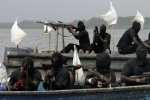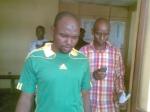Blog Archives
Boko Haram: We planted post-inauguration bombs, killed Shehu of Borno’s brother
 On 31 May, a man who gave his name as Abu Zaid (or Zayd) and claimed to be the deputy spokesman of the militant Islamist sect, Boko Haram, told the BBC Hausa Service that his group was responsible for the post-inauguration blasts in Bauchi, Zaria and Zuba near the Federal capital, in which at least 17 people were killed.
On 31 May, a man who gave his name as Abu Zaid (or Zayd) and claimed to be the deputy spokesman of the militant Islamist sect, Boko Haram, told the BBC Hausa Service that his group was responsible for the post-inauguration blasts in Bauchi, Zaria and Zuba near the Federal capital, in which at least 17 people were killed.
The man, who spoke via telephone, told the BBC’s Hausa Service that some serving members of the Nigerian army had been used to carry out the bombings in the Bauchi barracks on 30 May. He said the soldiers had approached the sect, seeking to join its ranks, and that they were sent to bomb the barracks, as a test of their loyalty to Boko Haram.
Abu Zaid said the group was also responsible for killing Abba Anas Ibn Umar Garbai, younger brother of the Shehu of Borno, the second-highest Muslim leader in Nigeria, who was gunned down outside his home in Maiduguri, on 30 May. The Shehu of Borno is one of the most prominent Muslim figures in Nigeria – second only to the Sultan of Sokoto, the spiritual leader of Nigeria’s Muslims.
”We are the ones responsible for the killing of the junior brother of the Shehu of Borno,” Zayd said. “As we always say, these traditional institutions are being used to track and hunt us, that is why we attack them”.
He told the radio station, which broadcasts in Hausa languge in northern Nigeria, that the sect did not believe in the Nigerian constitution and he repeated a call for sharia (Islamic law) to be imposed nationwide.
“We are doing what we are doing to fight injustice. If they stop their satanic ways of doing things and the injustices, we would stop what we are doing,” Zayd said.
However, the Nigerian army spokesman Brig Gen Raphael Isa rejected the allegation of any soldiers planning to desert the Nigerian Army and join the sect.
“It is not correct”, he told the BBC News website. “Let him publish the names of those pledging loyalty to Boko Haram. This is not a banana republic. We are one army united and very, very loyal”.
The BBC could not verify the caller’s identity or his claims.
Bombs not imported but locally made, says Customs boss Abdullahi Dikko
On 12 April, the Comptroller-General of the Nigerian Customs Sevice (NCS), Alhaji Abdullahi Dikko, said the bombs that have been used by hoodlums and terrorists across the country in recent times were not smuggled in, but were made within the country.
Speaking on the Hausa Service of the British Broadcasting Corporation (BBC), the Customs boss rejected the notion that it is the negligence of the Customs service that had aided the smuggling of explosives into the country in recent times. He was emphatic that his men were not negligent in the discharge of their duties.
Said Dikko: “An individual can produce a bomb, and most of the bombs that exploded in Nigeria were locally made. They are local bombs. If you see the kind of bomb that is brought from outside, if it explodes, the devastation will be enormous”.
In the wake of several explosions in the country since 2010, there have been growing concerns that some parts of the country may be experiencing an influx of explosives. However, some observers have noted that most of the blasts that have occurred apparently involved Improvised Explosive Devices (IEDs) which could have been assembled or made within the country.
Threatened Attacks: MEND says it might bomb without warnings
On 15 March, the Movement for the Emancipation of the Niger Delta (MEND) warned that, in the light of attempts by the security agencies to dismiss its threat, it may resort to bombing without prior notice and then issue a statement of claim afterwards.
In an earlier statement on 12 March, MEND had threatened to commence simultaneous bomb attacks on oil installations in the Niger Delta and other strategic locations in Abuja and Lagos State; but it said it would issue warnings before each attack. The group advised the general public to stay away from all political gatherings or meetings of any sort.
In the latest email, signed by the group’s spokesperson, Jomo Gbomo, MEND urged Nigerians and all oil companies to disregard all attempts by the Federal Government and security services to dismiss its threats. The email said: “The government of Goodluck Jonathan has formed a habit of blaming its political opponents in other bomb attacks, so when we start to strike, we will sit back and watch how the blame game will continue to be played out by the government, after our statements of claims have being issued”.
It also said that MEND had gathered that some agents from the United States are training some members of the Nigeria Police in bomb detection, detonation and making improvised bombs. It said it found the development “very laughable coming from a country that cannot guarantee its own citizens’ security with their overwhelmed prison system, coupled with a useless and corrupt Nigerian police and security force that will end up selling this knowledge”.
Man arrested with “bombs”, 24hrs after deadly blasts in Suleja, near Abuja
On 4 March, operatives of the National Drug Law Enforcement Agency (NDLEA) arrested a 32-year-old man, Zakariya’u Garba, found with two canisters suspected to be bombs in New Wuse village (Sabon Wuse), few kilometres away from Suleja, Niger State. The arrest came barely 24 hours after the bomb blast at a People’s Democratic Party (PDP) campaign rally in the town the previous day, which claimed over 14 lives.
Sources say Garba, a Kaduna-based trader, was arrested by the NDLEA officers for allegedly being in possession of two explosive devices and Tiger branded dry cell batteries. He was apprehended at a post mounted by officers of the NDLEA who were searching for hard drugs but then stumbled on the two metallic objects believed to be bombs.
Confirming the arrest, the Commander of the NDLEA, Alhaji Abdullahi Abdul, told journalists that his men at the old toll gate in New Wuse stopped a Kaduna-bound bus conveying 18 passengers and found the two canisters of explosives among the luggage of the suspect. The canisters were wrapped with a cream-coloured lace cloth and concealed in a black polythene bag. The NDLEA commander said the suspect was agitated when asked to reveal the contents of what he was carrying, which prompted his men to investigate further.
He said the suspect’s hand-held phone also contained messages that suggest security breaches, but that the contents of the messages would not yet be released, so as not to jeopardise investigations.
Garba, speaking in Hausa, denied any knowledge of the explosives, adding that he had nothing to do with them. But the driver of the bus, Malam Shafiu Sani, said that when he picked Garba from Madalla, a town in Suleja Local Government Area (along Kaduna-Abuja road), the suspect came onto the bus with the bag. Aside the driver of the vehicle, other passengers also testified that the suspect brought a bag with him onto the vehicle.
Investigation is continuing.




